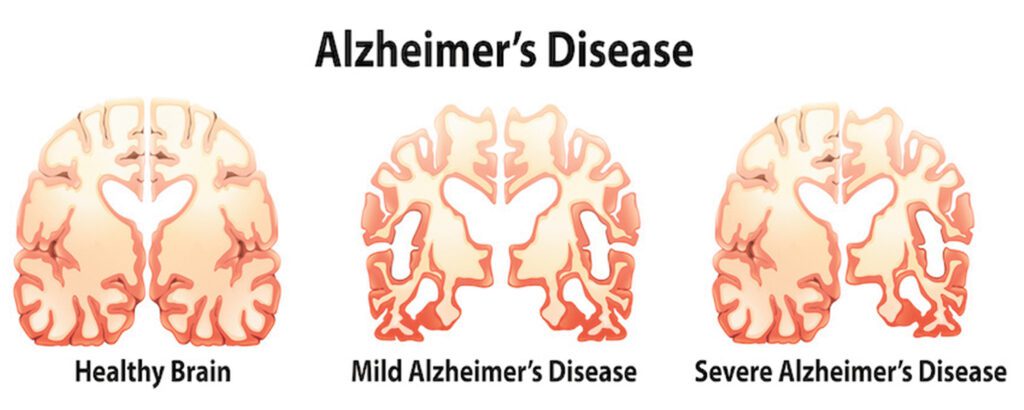While many people use Alzheimer’s and dementia interchangeably, these don’t mean the same thing. What exactly is the difference?
Dementia is a word used to describe many diseases that lead to memory loss, problems with language, changes in behaviors, and difficulties with thinking or planning. Alzheimer’s is a neurodegenerative disease that causes dementia — and it’s the most common cause of dementia out there, accounting for as many as seven in 10 cases of dementia.
Alzheimer’s dementia involves memory loss and cognitive problems, which scientists understand to be connected somehow to deposits of toxic proteins in the brain, which get in the way of neuron activity and eventually lead to the death of brain cells.

Other forms of dementia have similar symptoms, but those that aren’t due to Alzheimer’s might have different symptoms that appear first — and they might require different treatments. Here’s a quick look at the most common dementias, including Alzheimer’s, vascular dementia, Lewy body dementia, and frontotemporal dementia.
Common types of dementia
Alzheimer’s disease
Many scientists think that Alzheimer’s disease is caused in part by the buildup of toxic protein plaques—amyloid and tau—which causes progressive cell death, memory loss, and thinking problems. There are many factors, including genes like APOE4, exercise, diabetes, and cardiovascular health, that can affect the risk of developing the disease.
Alzheimer’s is diagnosed by measuring the levels of amyloid in the brain using a brain scan or through a lumbar puncture, though blood tests are on the way. Some drugs are available to treat the cognitive and behavioral symptoms of the disease, and one drug called Leqembi can slow the course of the disease in the earliest stages.
Vascular dementia
Vascular dementia is the second most common form of dementia. Damage to the brain’s blood vessels prevents nutrients and oxygen from getting to the brain, causing the cells to die. The symptoms will depend on where the blood vessels are damaged. For example, if it’s blood vessels near the language region of the brain, a person with vascular dementia might develop problems with their speech.
Vascular dementia shares cardiovascular risk factors with Alzheimer’s disease, like obesity, hypertension, and diabetes. People who experience strokes or heart disease are at an elevated risk of vascular dementia. Vascular dementia can be detected using an MRI brain scan, which can spot damaged blood vessels, alongside cognitive testing. There are currently no treatments for this form of dementia.
Frontotemporal dementia
You might have heard of this form of dementia on the news: frontotemporal dementia. Bruce Willis has it. FTD often affects people between the ages of 50 and 60, causing parts of the brain important for language and understanding to die off. People with FTD often have a buildup of tau protein tangles and another misfolded protein called TDP-43 in their brain.
FTD may be more difficult to diagnose as there are no specific biomarkers. While some doctors may prescribe antidepressants off-label to treat some of the symptoms, scientists have not yet developed a treatment or cure for this disease.
Lewy body dementia
This form of dementia is caused by the buildup of a misfolded protein called alpha-synuclein in the brain, which causes progressive cell death. People first develop issues with thinking and then develop problems with moving.
Like FTD, this dementia with Lewy bodies is challenging to diagnose because there aren’t any biomarkers. Getting the diagnosis right is important because some drugs used to treat behavioral symptoms in Alzheimer’s cause harmful side effects in people who have dementia with Lewy bodies.
A precision approach to zeroing in on dementia
Right now, getting a precise diagnosis is difficult because there are many overlapping symptoms across dementias, and some people may develop multiple types at once. In clinical research, blood tests are being developed and tested to determine if they will potentially be able to tell the difference, making an early diagnosis accessible to everyone.
We’re partnering with people just like you in the search for innovative new treatments. Learn how dementia can impact you, even if your memory is normal. We offer free assessments so you can learn about your brain health and your risk of developing Alzheimer’s. Plus, we’ll inform you if you might qualify for a new clinical trial designed to slow down the progression of Alzheimer’s.
Call 352-441-2000 to schedule your free memory screen today!
352-441-2000
www.charterresearch.com
1025 Lake Sumter Landing
The Villages, FL 32162
 Central Florida Health and Wellness Magazine Health and Wellness Articles of the Villages
Central Florida Health and Wellness Magazine Health and Wellness Articles of the Villages



